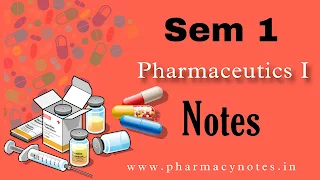Handwritten Notes
Semester I
BP103T. PHARMACEUTICS- I (Theory)
UNIT — I
Historical background and development of the profession of pharmacy: History of the profession of Pharmacy in India in relation to pharmacy education, industry, and organization, Pharmacy as a career, Pharmacopoeias: Introduction to IP, BP, USP and Extra Pharmacopoeia
Dosage forms: Introduction to dosage forms, classification, and definition
Prescription: Definition, Parts of prescription, handling of Prescription, and Errors in prescription.
Posology: Definition, Factors affecting posology. Pediatric dose calculations are based on age, body weight, and body surface area.
UNIT — II
Pharmaceutical calculations: Weights and measures Imperial & Metric system, Calculations involving percentage solutions, allegation, proof spirit and isotonic solutions based on freezing point and molecular weight.
Powders: Definition, classification, advantages and disadvantages, Simple & compound powders official preparations, dusting powders, effervescent, efflorescent and hygroscopic powders, eutectic mixtures. Geometric dilutions.
Liquid dosage forms: Advantages and disadvantages of liquid dosage forms. Excipients used in the formulation of liquid dosage forms. Solubility enhancement techniques
UNIT — III
Monophasic liquids: Definitions and preparations of Gargles, Mouthwashes, Throat Paint, Eardrops, Nasal drops, Enemas, Syrups, Elixirs, Liniments, and Lotions.
Biphasic liquids:
Suspensions: Definition, advantages and disadvantages, classifications, Preparation of suspensions; Flocculated and Deflocculated suspension & stability problems and methods to overcome.
Emulsions: Definition, classification, emulsifying agent, test for the identification of the type of emulsion, Methods of preparation & stability problems, and methods to overcome
UNIT — IV
Suppositories: Definition, Types, advantages and disadvantages, types of bases, methods of preparations. Displacement value & its calculations, evaluation of suppositories.
Pharmaceutical incompatibilities: Definition, classification, physical, chemical, and therapeutic incompatibilities with examples.
UNIT — V
Semisolid dosage forms: Definitions, classification, mechanisms, and factors influencing dermal penetration of drugs.Preparation of ointments, pastes, creams, and gels. Excipients are used in semi-solid dosage forms. Evaluation of semi-solid dosage forms.
Recommended Books: (Latest Edition)
1. H.C. Ansel et al., Pharmaceutical Dosage Form and Drug Delivery System, Lippincott Williams and Walkins, New Delhi.
2. Carter S.J., Cooper and Gunn’s-Dispensing for Pharmaceutical Students, CBS Publishers, New Delhi.
3. M.E. Aulton, Pharmaceutics, The Science& Dosage Form Design, Churchill Livingstone, Edinburgh.
4. Indian pharmacopeia.
5. British pharmacopoeia.
6. Lachmann. Theory and Practice of Industrial Pharmacy, Lea& Febiger Publisher, The
The University of Michigan.
7. Alfonso R. Gennaro Remington. The Science and Practice of Pharmacy, Lippincott
Williams, New Delhi.
8. Carter S.J., Cooper and Gunn's. Tutorial Pharmacy, CBS Publications, New Delhi.
9. E.A. Rawlins, Bentley’s Text Book of Pharmaceutics, English Language Book Society,
Elsevier Health Sciences, USA.
10. Isaac Ghebre Sellassie: Pharmaceutical Pelletization Technology, Marcel Dekker, INC,
New York.
11. Dilip M. Parikh: Handbook of Pharmaceutical Granulation Technology, Marcel Dekker,
INC, New York.
12. Francoise Nieloud and Gilberte Marti-Mestres: Pharmaceutical Emulsions and Suspensions, Marcel Dekker, INC, New York.









Please do not enter any spam link in the comment box.